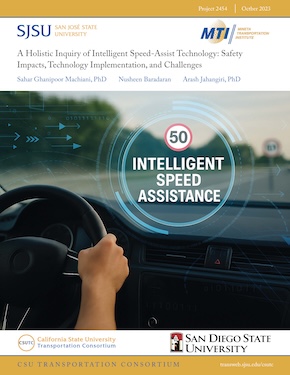- 408-924-7560
- mineta-institute@sjsu.edu
- Donate
A Holistic Inquiry of Intelligent Speed-Assist Technology: Safety Impacts, Technology Implementation, and Challenges
Speeding is a leading contributor to roadway fatalities in the United States, and California consistently ranks among states with the highest number of speed-related crashes. Intelligent Speed Assistance (ISA) technology has emerged as a solution aimed at mitigating this issue by notifying drivers of speed limits and, in some cases, intervening and lowering the speed to the posted speed limit. This work presents a comprehensive investigation into ISA system safety benefits, implementation challenges, and public perception, with a focus on California drivers. This study utilized a multi-method approach. A literature review explores the history, regulatory barriers, and international trails of ISA systems. A large-scale quantitative analysis was conducted on over two million consumer complaints and nearly 300,000 recall records from the National Highway Traffic Safety Administration. Filtering for ISA-related issues revealed over 100,000 relevant complaints and 6,000 related recalls, uncovering recurring themes including system malfunctions, override limitations, sensor and mapping errors, and unintended acceleration. An original survey of 286 licensed California drivers was administered to assess public awareness, behavioral tendencies, and attitudes towards ISA technology. While a majority of participants acknowledged the potential safety benefits of ISA, many expressed concerns regarding the loss of driver autonomy, system reliability, and data privacy. Drivers favored advisory or supportive ISA systems that provide feedback without fully controlling vehicle speed. The finding suggests that while ISA systems are well-positioned to reduce speeding and enhance road safety, their success hinges on thoughtful design, user trust, and supportive policy. As California and other states consider broader implementation, aligning driver preferences with technological capabilities and regulatory frameworks will be essential to using ISA to improve safety.
Dr. Sahar Ghanipoor Machiani, PhD (Civil Engineering, Virginia Tech, 2014)
Dr. Sahar Ghanipoor Machiani is an Associate Professor in San Diego State University’s (SDSU) Department of Civil, Construction, and Environmental Engineering and the Co-Director of the SDSU Smart Transportation Analytics Research (STAR) Lab. Before joining SDSU, she worked as a Research Associate at the Center for Infrastructure-Based Safety Systems, Virginia Tech Transportation Institute (VTTI). She has expertise in traffic safety, driver behavior modeling, automated vehicles, and infrastructure-based safety systems.
Nusheen Baradaran
Nusheen Baradaran is a Master of Science candidate in Civil Engineering at SDSU, specializing in transportation systems and intelligent vehicle technologies. Her research explores the implementation and behavioral impacts of Intelligent Speed Assistance (ISA), integrating empirical data analysis with human factors insights. Alongside her academic work, she is a full-time civil engineer in the land development sector, focusing on coastal single-family residential projects. Her combined professional and academic experience informs a practical, interdisciplinary approach to transportation safety and emerging vehicle technologies.
Dr. Arash Jahangiri, PhD (Civil Engineering, Virginia Tech, 2015)
Dr. Arash Jahangiri is an Associate Professor in the SDSU Department of Civil, Construction, and Environmental Engineering and the Co-Director of the SDSU Smart Transportation Analytics Research (STAR) Lab. From 2012 to 2015, he conducted research in transportation safety at the Center for Sustainable Mobility (CSM) at Virginia Tech Transportation Institute (VTTI). He has expertise in data mining techniques, statistical analysis, machine learning algorithms, and traffic safety.
-
Contact Us
San José State University One Washington Square, San Jose, CA 95192 Phone: 408-924-7560 Email: mineta-institute@sjsu.edu






